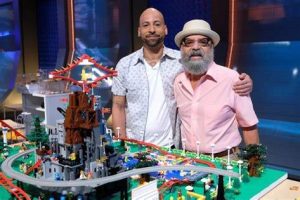
Unit 14
Lego
新知思想/閱讀種子
New Knowledge/Reading Knowledge
BRAIN STORM
Share your ideas with your teacher and try to make sentences.
Have you hear about Lego? What can you create with Lego?
VOCABULARY
Repeat these sentences after your teacher.
1. encapsulated (adj.) 扼要表述;概括
Lego encapsulated the meaning of “fun”.
樂高封裝了“樂趣”的含義。
2. interlocking (v.) 互相咬合的,緊密連接的
You can build things by interlocking blocks!
您可以通過互鎖塊來構建事物!
3. spawned (n.) (使)產生,(使)突然增長
The lego concept spawned hollywood parks.
樂高概念產生了好萊塢公園。
4. multitude (n.) 許多,眾多
The company did not even receive a multitude of complaints.
該公司甚至沒有收到很多投訴。
5. decimation (v.) 毀滅,大幅削減
Lego aims the decimation of gadget time.
樂高的目標是抽取小工具的時間。
6. Hail Mary (phr.) 萬福馬利亞;孤注一擲的舉動
Lego made a desperate Hail Mary.
樂高拼命地向瑪麗致敬。
7. open-ended (adj.) 開放式的;無限制的
The director can only answer open-endedly.
導演只能公開回答。
Dialogue
Read the dialogue aloud with your teacher.

It’s been said that “Everything is better when we stick together.” LEGO has been sticking together both literally and figuratively since the 1930s.
The name “LEGO” comes from the Danish for “play well,” and this name has encapsulated the company’s mission from the get-go.
LEGO’s system of interlocking bricks has spawned multiple Hollywood blockbusters as well as worldwide theme parks.
However, the 1990s saw a multitude of new technology competing for children’s attention spans, and with it the decimation of the company’s bottom lines.

In a desperate Hail Mary, LEGO forged its first licensing deal with the Star Wars franchise, a move that has been credited with saving the company.
That kicked off a trend that has seen LEGO shift its focus away from open-ended play and toward using popular IP like Batman or Harry Potter.
One such agreement was with Minecraft, the wildly popular video game that is often erroneously believed to have been created by LEGO itself.
Now, Lego is as popular as ever. The tenth Legoland is slated to open in Shanghai in 2022, cashing in on the brand’s massive popularity with both kids and adults in China.
Grammar
Literally and figuratively
“Literally” is a word that annoys a lot of people in English. Or rather, it’s not the word itself, but the usage that makes people angry.
The literal meaning of literally is just that, “in a literal manner” or “exactly.” However, often people use “literally” to emphasize something, as in “I haven’t seen you in a million years, literally!” Unless both of those people are millions of years old, it can’t be literally true. It can, however be figuratively true.
Sometimes, owing to the nature of language, we encounter situations where a figure of speech can also be literally true. I could “run into someone” if I accidentally came around a corner too fast and crashed into them.
Today, we were able to use the phrase “sticking together” in this way. LEGO has “stuck together” as a company for a long time. It also happens to be a company that makes plastic bricks that can stick together.
1.That was literally the worst movie that has ever been filmed!
2.I was literally blown away by all of the positive feedback and support I received.
3.Our last meeting literally went on forever because Sally wouldn’t stop talking.
4._____________________________________________________________________.
DISCUSSION
Make a conversation with your teacher.
1.What do you think makes Lego fun to play?
2.What makes Legos special?
3.Why are Legos so expensive?


